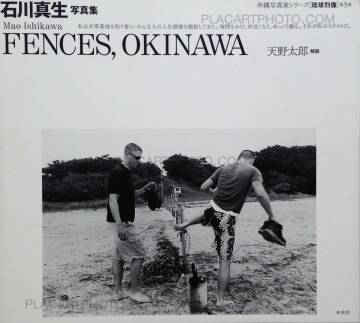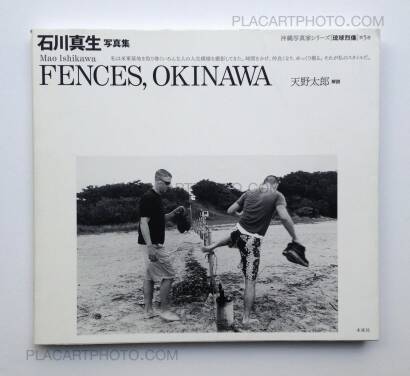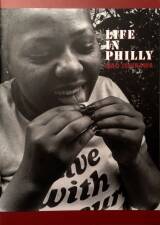Fences, Okinawa

Mao Ishikawa
Fences, Okinawa
Photographs: Mao Ishikawa
Text: Mao Ishikawa
Publisher: Mirai-sha
160 pages
Comments: Softcover under dust jacket, 240 x 265 mm. Obi is missing. First edition, 2010. Text in japanese. In very good condition.
I grew up in the years before the Okinawa Reversion of 1972. I remember that there were many crimes committed by US soldiers and that many of them were not punished. Some were sent back to the US covertly, while others were somehow found innocent. I was often puzzled as to why. My parents and teachers and the TV news told me the stories of those crimes.
As an Okinawan child I grew up wondering: Are we Okinawans Japanese? Why was Okinawa cut off from Japan? If Okinawa reverts to Japan, will we be protected by the Japanese constitution? Would such injustice then disappear?
I chose to become a photographer because I was born in Okinawa. I wanted to take photos of the military bases.
I learned technical photography skills at school when I was twenty years old. After I finished school I began my career as a photographer, focusing on Okinawa in relation
with the US military bases and US soldiers. And I came up with the idea of taking photos of soldiers while working as a barmaid in a “for US soldiers only” joint. I did not speak any English then, but I thrust myself into a bar for black soldiers and began to take photos of soldiers and both Okinawan and Japanese barmaids.
It has been thirty seven years since I started photography. I have worked on various lives surrounding and inside the bases. I wait until the subjects become comfortable with me, and then shoot. It takes a great deal of time to do one project. This has been my style as a photographer.
The US Marines are trained and based in Okinawa, South Korea, Australia, Guam, and the Philippines. They drink and talk a lot while they are in Okinawa, and then they will be sent to Afghanistan. They are now planning to move the Marines bases. Where will the US bases in Okinawa go? How will they change?
When I walk around base towns I can clearly see how the US military operates as I see the soldiers movement. US soldiers move from Okinawa to many places in the world to fight, which Okinawan people sometimes do not realize. I take photos of the young soldiers regardless.











more books by Mao Ishikawa
-
Life in Philly
by Mao Ishikawa
sold -
A Port Town Elegy (Signed)
by Mao Ishikawa
sold -
Hot days in Camp Hansen (Signed) (Last copies!)
by Mao Ishikawa
sold -
Hot Days in Okinawa (Signed)
by Mao Ishikawa
sold -
Morika's Dreams (Signed)
by Mao Ishikawa
sold -
Fences, Fuck You !! (Signed)
by Mao Ishikawa
sold -
A Port Town Elegy (Signed)
by Mao Ishikawa
sold -
Sachiko Nakada's Theater Company (Signed)
by Mao Ishikawa
sold -
Hot days in Camp Hansen (Signed copy)
by Mao Ishikawa
sold -
Philippine (Signed)
by Mao Ishikawa
sold -
A Port Town Elegy (SIGNED 1ST EDT)
by Mao Ishikawa
Euro 250 -
Red Flower - The Women of Okinawa /Akabana - Okinawa no onna
by Mao Ishikawa
sold -
Life in Philly (Special edition)
by Mao Ishikawa
Euro 940
more books tagged »japanese« | >> see all
-
Cities : Spaces between real and unreal (Signed)
by Eimu Arino
sold -
Dregs (Signed. Ltd Edition of 80)
by Daisuke Yokota
sold -
Inversion, Negative (Signed, display copy)
by Daisuke Yokota
sold -
Nakazora (SIGNED)
by Masao Yamamoto
sold -
YUGI (Homo Ludence)
by Masahisa Fukase
sold -
a priori innerplants (Signed)
by Mazuki Yoko
sold
more books tagged »okinawa« | >> see all
-
Let us know about Okinawa (Signed)
by Ari Hatsuzawa
sold -
Bifuu complete set (12 vol)
by Collective
sold -
Okinawan portraits 2010-2012 (Signed)
by Ryuichi Ishikawa
sold -
みゃーくとぅなぎ すまとぅなぎ / Myāku tunagi, Sumatu nagi : (ONLY 20 COPIES)
by Ryu Ika
sold -
Nanamui : 1997-2001
by Toyomitsu Higa
sold -
Another time on the Ryukyu Islands (Signed)
by Tsuneo Yamashita
sold
more books tagged »mirai-sha« | >> see all
-
Tabisuru shima
by Tatsuhiko Kanou
sold -
Sayonara America
by Katsu Moriguchi
Euro 45 -
Okinawa, Amami, Tokara 1974-1978
by Takuma Nakahira
sold -
Chizu ni nai mura
by Hiroaki Oshiro
sold -
Kokyou ha senjyo datta
by Minoru Yamada
sold -
THE GREEN MANTLE
by Kazuko Hamachi
sold
Books from the Virtual Bookshelf josefchladek.com
































_-_guevara_shashinshu_-_che_(ゲバラ写真集_チェ_ブエノスの灯_編_年現代書館発行);jpg)





 Facebook
Facebook Instagram
Instagram